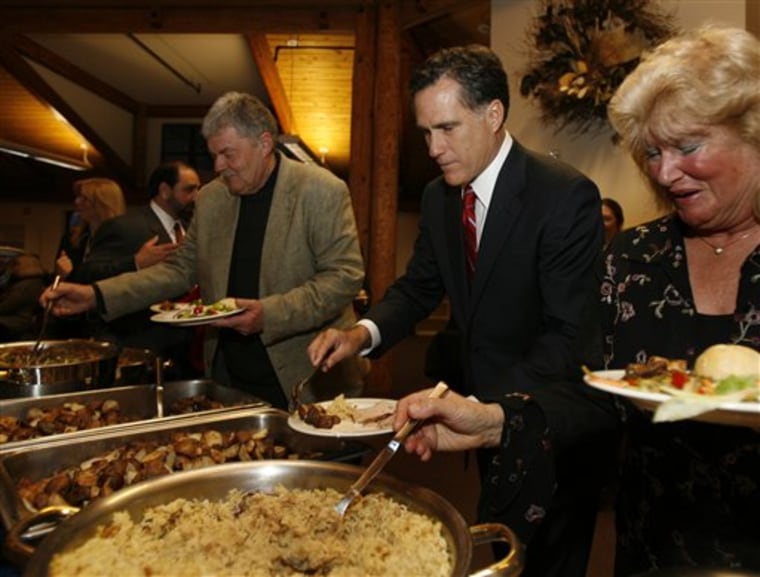Presidential hopefuls Rudy Giuliani, John McCain and Mitt Romney want you to know they'll be cheapskates with taxpayer money - and they'll be proud of it.
"This country needs a president who can exercise fiscal discipline!" cries Giuliani, the former New York City mayor. Romney, the ex-governor of Massachusetts, asserts: "It makes no sense for us to keep on spending more money than we take in." And, McCain, the Arizona senator, adds: "We need to get it under control."
With such crowd-pleasing lines, the leading Republican presidential candidates are making limited spending a key part of their campaigns as they court voters frustrated with soaring deficits and lawmakers' pet projects.
Fiscal conservatives
The pitch is aimed at the GOP's economic conservatives, who are important to winning the Republican nomination - and their support might be more likely than the party's social conservatives voting for any of them.
Conservatives make up a significant part of the GOP base, with more than 68 percent of Republicans identifying themselves with that label in an Associated Press-Ipsos poll this month. However, a recent study found only 28 percent of those in the Republican Party call themselves hard-core social conservatives. That means a fiscally conservative message could have wide impact.
Spending restraint also is a topic that cuts across party lines and, thus, it could benefit candidates in states whose primary contests aren't limited to Republican voters.
"It's a unifying theme," said David Keating, executive director of the anti-tax group Club for Growth. "No one wants Congress and the president wasting their money."
Irresponsibility budgeting
Like all voters, Republicans care deeply about economic issues, such as taxes and spending, even though Iraq and terrorism remain their foremost concerns.
Over the past few years, pollsters say, Republicans have grown increasingly agitated by what they call irresponsible budgeting in Washington, but they haven't been as vocal about it as Democrats, perhaps to avoid being critical of President Bush and GOP lawmakers who controlled Congress until this year.
"Maybe these candidates can tap into something that's been under the surface for some time," said Andrew Kohut, director of the Pew Research Center. "It's also a nice way, perhaps, for them to distance themselves from President Bush in a way that other Republicans wouldn't see as disloyal."
At the same time, Giuliani, McCain and Romney may have little choice but to try to reach conservatives with economic messages rather than social messages. For various reasons, conservatives who oppose abortion, gay rights and gun control haven't fully embraced any of the three top candidates.
"Since they all have problems appealing to social conservatives, they have to look to see where their strengths are as candidates," said Costas Panagopoulos, a Fordham University political science professor.
Thus, fiscal restraint is a pillar of all three campaigns.
Get some backbone
Lesser-known GOP candidates, including Arkansas Gov. Mike Huckabee, Kansas Sen. Sam Brownback and ex-Gov. Tommy Thompson of Wisconsin, also have taken up the cause. Those three call themselves strong fiscal conservatives, advocating lower taxes and more frugal spending.
It's a message that resonates with Republicans like Rick and Carol Hammen of Clive, Iowa. They list spending, taxes and the economy as second only to security as issues that matter most to them.
"The Republican Party has got to get some backbone. Important bills should not have pork attached, and the veto pen has got to come out," Carol Hammen says. Adds Rick Hammen: "We would be in a lot better shape if we controlled our spending."
Candidates' records
Mindful of such sentiments, Giuliani draws on his experiences as mayor of the country's largest city to argue that he practices what he preaches.
"We need to reduce spending," he told a crowd in West Des Moines, Iowa, recently. "That's how you make government more effective, that's how you make government more efficient."
Despite his pitch, records from New York City's independent budget office show the city payroll grew during his tenure and fees and fines increased. Giuliani also successfully sued to challenge the constitutionality of the line-item veto that would have given President Clinton the power to eliminate wasteful spending.
In a visit to Iowa's statehouse in Des Moines, Romney sounded similar themes. "We have to rein in spending," he declared, and then acknowledged: "We spent too much as Republicans."
Echoing a TV ad he's running, Romney proposed capping discretionary nonmilitary spending at the inflation rate minus 1 percent, and he vowed to veto any bill that Congress sends him that's above that level.
His campaign often boasts that he turned a $3 billion budget deficit into a $1 billion surplus as governor. The state's fiscal health clearly improved during his tenure, but state budget analysts say both numbers are inflated. And while Romney refused to raise taxes, he boosted fees for state services and closed so-called corporate tax loopholes in what critics call a back-door tax increase.
McCain gave a speech Monday in Memphis, Tenn., in which he renewed his long-standing campaign to curtail government spending. He frequently tells voters that Republicans lost power in Congress in November because the GOP squandered taxpayers' money.
"The spending got out of control and we got the greatest increase in the size of government since the Great Society," McCain said recently in Mason City, Iowa. He mocked a $3 million plan to study the DNA of bears in Montana and a proposal to build a $223 million "bridge to nowhere" in Alaska.
Then, he declared: "When one of these bills comes across my desk and it has a pork-barrel project in it, I will veto it and I will make the author of it famous, I promise you!"
McCain typically earns high marks from fiscal conservatives for his push to curtail wasteful spending. But critics take issue with his position on taxes. McCain opposed Bush's tax cuts in 2001 and 2003 but now advocates extending them. He says that doing otherwise would amount to a tax increase.
